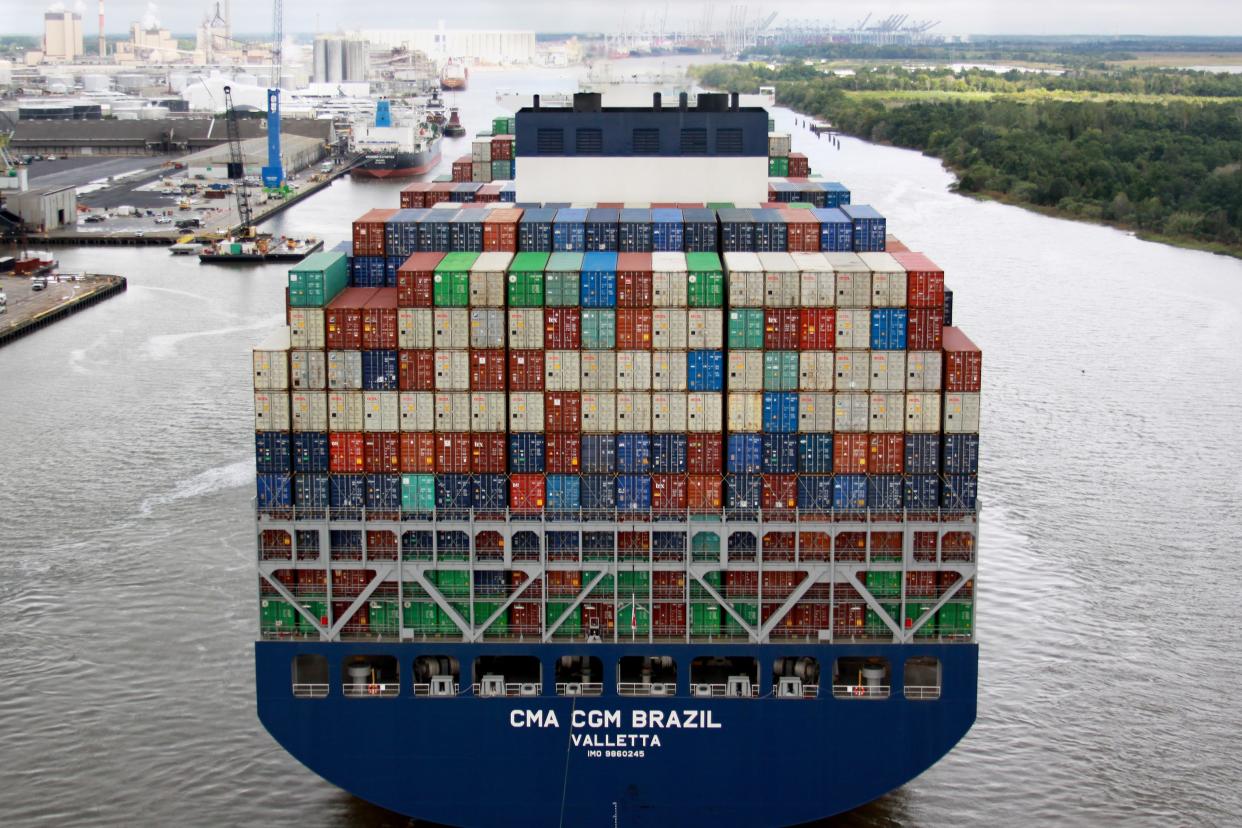GPA looks to pay for faster federal review of Savannah River terminal project

The Georgia Ports Authority plans to tap its financial resources to expedite approval of a key permit for a proposed 400-acre terminal on the Savannah River, and federal officials say they intend to go along with the deal.
But not before the public has a chance to weigh in, the U.S. Army Corps of Engineers disclosed in a notice posted Wednesday.
The corps is evaluating whether the project on Hutchinson Island meets requirements of the federal Clean Water Act after ending public comment on GPA's related permit request late last year.
Before that permit can be issued, however, Section 408 of the Clean Water Act requires USACE to determine whether the work would significantly impact other federally authorized projects.
"(Wednesday's) public notice is requesting comments on our intent to accept funds (from GPA) to expedite the processing of the 408 permit," said Cheri Pritchard, spokesperson for the USACE Savannah District. "
That input will be accepted through March 7.
Pritchard added that USACE is working with GPA in the application process for potential payments.
The corps' ended public comment on GPA's primary permit application on Christmas Day, despite pleas from environmental and social justice organizations to extend the deadline a second time. USACE had already added 30 days to the comment period and said "extending it further isn’t warranted."
Critics argued that more time was needed to digest the 56-page permit application for the mega-complex.
In terms of a pay-for-pace arrangement with GPA, "the USACE Savannah District does not expect priority review of the requester’s projects to negatively impact the Section 408 program or to increase the time for evaluations of other projects since additional staff may be hired to augment these priority reviews," the corps said in its notice, which did not include financial terms.
Dredging again: Does Savannah's harbor need to be deepened again? GPA, politicians urge study
'Maintaining a 20% cushion'
According to the permit application, GPA expects the terminal, which will house cargo containers transported on ships, to add 2.7 million “20-foot equivalent units” in overall capacity.
Expansion projects already underway are expected to absorb projected growth at the booming ports for another decade. But GPA argues that without added capacity from the proposed terminal, increased activity through 2035 will eat away at overflow space.
“Maintaining a 20% cushion provides operational flexibility” and allows the ports to “run efficiently through the peaks and valleys of the shipping season,” GPA says in its application.
The Port of Savannah completed a $937 million expansion – including deepening the harbor channel to allow for larger vessels – in 2022. GPA is proposing another project to add still more depth.
The requested terminal permit applies to regulations in the U.S. Clean Water Act regarding the discharge of dredged or fill material into public waters. The port’s plan calls for dredging more than 2.5 million cubic yards of material from nearly 30 acres of open water and 8.6 acres of tidal area. “Annual maintenance dredging” of an estimated 250,000 cubic yards would continue after completion of the project.
The application calls for filling in nearly 27 acres of freshwater wetlands and 5.6 acres of salt marsh on Hutchinson Island.
The site now includes 127 acres of salt marsh, nearly 41 acres of “intertidal or subtidal water bottoms” and 36 acres of freshwater wetlands.
Fueling debate: Expansion of Savannah natural gas export facility at crux of nation's climate debate
'Serious implications for ... important natural resources'
In comments ahead of the Christmas deadline, a coalition of conservation and social justice groups urged USACE to carefully weigh the potential impact on the environment and residents who live nearby.
“The project site contains various aquatic habitats, including estuarine waters, freshwater marsh, freshwater forested wetlands and mixed hardwood uplands,” the organizations said in a 26-page document. “This major development project will have serious implications for these important natural resources, and the Corps must fully assess these impacts before approving the project.”
The Southern Environmental Law Center drafted the document on behalf of the Savannah Riverkeeper, Georgia Conservancy, Ogeechee Riverkeeper, One Hundred Miles, South Carolina Coastal Conservation League and South Carolina Wildlife Federation.
Commenters also noted the prospective human impact.
About 96 percent of residents within one mile of the proposed terminal are people of color, and 60% are considered low-income, according to the Environmental Protection Agency. The same people face more exposure to particulate matter and other pollutants than 90% of the population, the EPA says.
Wednesday’s posting noted that the corps "shall ensure that the use of funds accepted ... will not impact impartial decision making with respect to permits, either substantively or procedurally.
John Deem covers climate change and the environment on the Georgia coast. He can be reached at jdeem@gannett.com.
This article originally appeared on Savannah Morning News: GPA looks to pay for faster review of Savannah River terminal project

